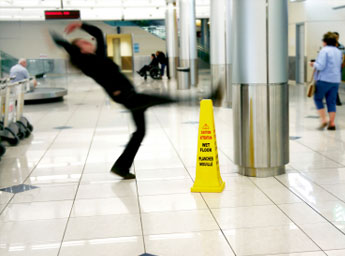Spilled liquids in a grocery store. Cracked pavement in a parking lot. Misplaced items blocking a path.
Occurrences like these happen all too frequently and lead to slips and falls and premises liability lawsuits. Approximately one million Americans suffer from slip and fall accidents each year and unfortunately many go unresolved.
What is a slip and fall case? It’s a type of premises liability claim. Florida property owners are legally obligated to ensure that their property is reasonably safe for those people lawfully on it. The current slip and fall law in Florida is derived from the 2001 Supreme Court of Florida decision Owens v. Publix Supermarkets, Inc., 82 So.2d 315 (Fla. 2001). This ruling held that the presence of liquid or dangerous substances on a floor created a presumption that the property was not maintained in a reasonably safe condition. This ruling did lead to many frivolous claims and ultimately stricter laws in Florida regarding slip and fall injuries.
But what must be proved today to recover for a slip and fall? Some think that if a store owner or home owner doesn’t have actual knowledge of such dangers, they couldn’t be held responsible for the injuries of a customer or guest on their property. That’s currently not the case in Florida.
In fact, current Florida law states that those injured in a slip and fall only need to prove that home owners or store owners had constructive knowledge of the dangerous condition that caused a fall, and that they should’ve taken action to remedy it.
According to Florida Statute 768.0755, constructive knowledge means a showing that:
(a) The dangerous condition existed for such a length of time that, in the exercise of ordinary care, the business establishment should have known of the condition; or,
(b) The condition occurred regularly and was therefore foreseeable.
Essentially, proving that a store owner knew of a spill or dangerous condition isn’t necessary. Showing that they should have known about it is all that is required. There are several ways an attorney can help prove these elements such as helping you obtain video surveillance from a store or seeking out witness statements.
Often, businesses are quick to attend to fall victims for fear of legal repercussions. Instantaneously spills are cleaned up, warning signs are posted, and witnesses are shoed away. But you can help protect your rights and preserve your claim! If you suffer a slip and fall accident, take pictures if you have a camera phone. Ask witnesses for their names or contact information. Most people know to take these precautions in car accidents, but wouldn’t consider such behavior if involved in a slip and fall. But these actions help if you are on the road and they even help if you are in Aisle 9 of your local supermarket.
What if you fall at work? Some people think that worker’s compensation may bar recovery for a slip and fall that occurs on the job. That is not necessarily true. Florida Statute Section 440 is Florida’s Worker’s Compensation law. This law does say that generally a worker who slips and falls at work cannot sue an employer for negligence. However, there are exceptions to this rule. For example, an employee can recover if they are hurt at work due to the acts of someone other the owner or if they are intentionally harmed in the workplace.
If you have been injured in a slip and fall accident at another person’s home or business, you could potentially recover payment for any medical bills or lost earnings incurred as a result of that person’s negligence or recklessness. Contact Dolman Law Group Accident Injury Lawyers, PA today and talk to an experienced professional about assistance in such difficult times. Call us today at (727) 451-6900






